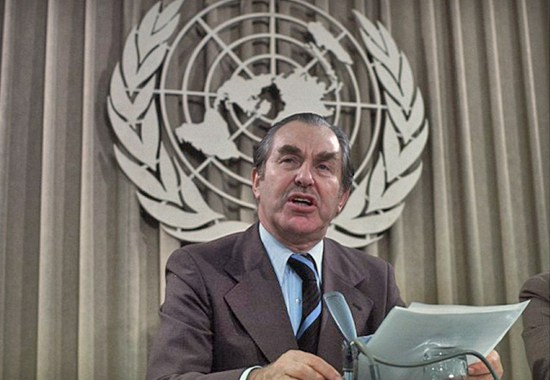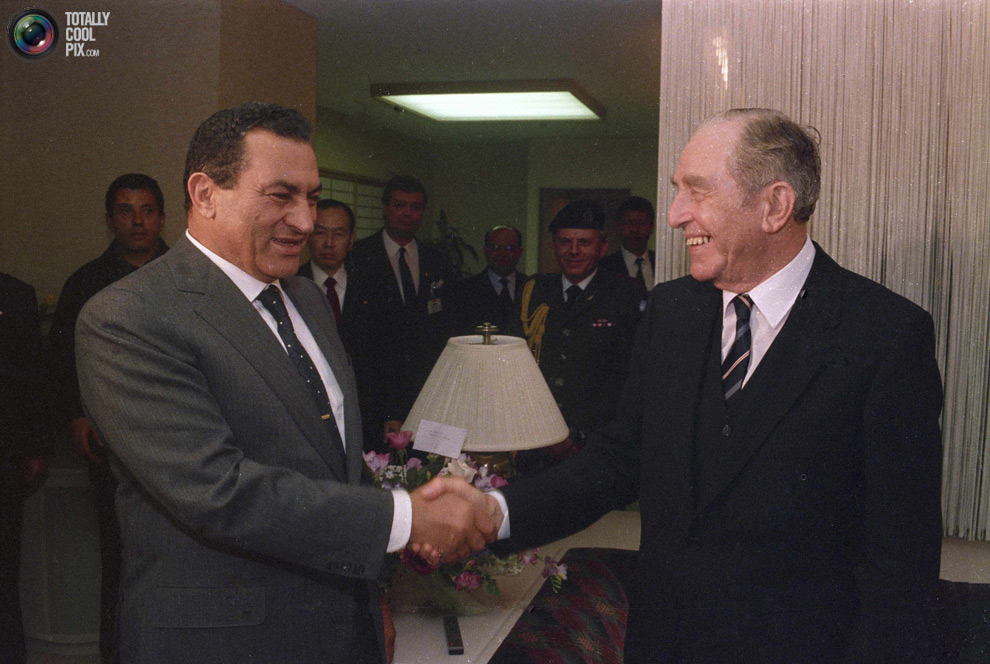<Back to Index>
- 6th President of Israel Chaim Herzog, 1918
PAGE SPONSOR
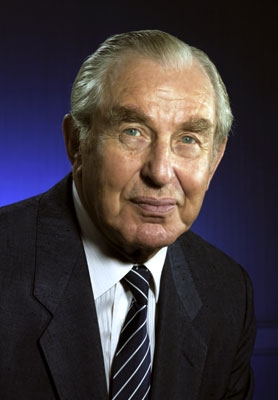
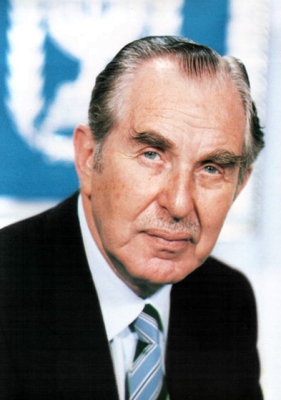
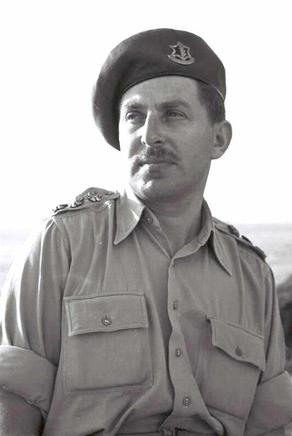
Chaim Herzog (Hebrew: חיים הרצוג, 17 September 1918 – 17 April 1997) served as the sixth President of Israel (1983 – 93), following a distinguished career in both the British Army and the Israel Defense Forces (IDF).
Herzog was born at Cliftonpark Avenue in Belfast, the son of notable Rabbi Yitzhak HaLevi Herzog, who was Chief Rabbi of Ireland from 1919 to 1937 (and later, of Palestine and Israel), and Sara (née Hillman). The family home (from 1919) was at 33 Bloomfield Avenue, Portobello in Dublin, Ireland. Herzog studied at Wesley College, Dublin, and was involved with the Federation of Zionist Youth during his teenage years.
He immigrated to Palestine in 1935, and served in the Jewish paramilitary group Haganah during the Arab revolt of 1936 – 39.
He went on to earn a degree in law at University College London, and then qualified as a barrister at Lincoln's Inn.
He joined the British army during World War II, operating primarily in Germany as a tank commander in the Armoured Division. There, he was given his lifelong nickname of "Vivian" because the British could not pronounce the name, "Chaim". A Jewish soldier had volunteered that "Vivian" was the English equivalent of "Chaim." He was commissioned into the Intelligence Corps in 1943 and participated in the liberation of several concentration camps as well as identifying a captured German soldier as Heinrich Himmler. He left the Army in 1947 with the rank of Major.
Immediately following the war, he returned to Palestine. After the establishment of the State of Israel, he fought in the 1948 Arab - Israeli War, serving as an officer in the battles for Latrun. His intelligence experience during World War II was seen as a valuable asset, and he subsequently became head of the IDF Military Intelligence Branch,
a position in which he served from 1948 to 1950 and again from 1959 to
1962. From 1950 to 1954, he served as defense attaché at the
Israeli Embassy in the United States. He retired from the IDF in 1962
with the rank of Major General.
After leaving the army, Herzog opened a private law practice. He returned to public life in 1967, when the Six Day War broke out, as a military commentator for Kol Israel radio news. Following the capture of the West Bank, he was appointed Military Governor of East Jerusalem, and Judea and Samaria.
In 1972 he went into partnership with Michael Fox and Yaakov Neeman, and established the law firm of Herzog, Fox & Neeman, one of the largest law firms in Israel.
In 1975 Herzog was appointed Israel's Ambassador to the United Nations, in which capacity he served until 1978. During his term the UN adopted the "Zionism is Racism" resolution (General Assembly Resolution 3379), which Herzog condemned and symbolically tore up (as his father had done to one of the British white papers regarding the British Mandate in Palestine), saying: "For us, the Jewish people, this resolution based on hatred, falsehood and arrogance, is devoid of any moral or legal value." In recent years British historians headed by Simon Sebag - Montefiore have included it in a book on speeches that changed the world, which includes others by Luther King, Mandela, Churchill and Kennedy.
In the 1981 elections Herzog entered politics for the first time, winning a seat in the Knesset as a member of the Alignment, the predecessor to the Labor Party.
On 22 March 1983, Herzog was elected by the Knesset to serve as the sixth President of Israel, by a vote of 61 to 57, against Menachem Elon, the candidate of the right and the government coalition. He assumed office on 5 May 1983 and served two five year terms (then the maximum permitted by Israeli basic law), retiring from political life in 1993. As president of Israel, Herzog made a number of visits abroad, being the first Israeli president to make an official visit to Germany, as well as visiting several far east countries, Australia, and New Zealand. He was also noted for pardoning the Shin Bet agent involved in the Kav 300 affair.
In 1985 Herzog visited Wesley College Dublin during his State Visit to Ireland, during which he opened the Irish Jewish Museum in Dublin, Republic of Ireland. While on his visit to Ireland, he also unveiled in Sneem Culture Park, Co Kerry, a modern polished steel Israeli sculpture, in honor of his childhood friend, Cearbhall Ó Dálaigh, the fifth President of Ireland.
Herzog was a hardened opponent of Saddam Hussein regime
in Iraq during his presidency of Israel, he referred to Iraq as a nest
"of world terror". He said the world largely dismissed Israel's warnings
that Baghdad was becoming a capital of world terrorism, adding that
some Western countries helped Hussein develop into a military power.
Herzog died on 17 April 1997, and is buried on Mount Herzl, Jerusalem.
Herzog controversially reduced the sentences of three imprisoned Jews, Menachem Livni, Uzi Sharbaf and Shaul Nir, members of the Jewish Underground, who were sentenced to life imprisonment in 1985 for the 1984 murder of four Palestinians in the West Bank town of Hebron. Herzog had reduced the sentences, first to 24 years, then to 15 years, and in 1989 he reduced the sentence to 10 years, which enabled the men to be released two years later on good behavior.
Herzog was the brother - in - law of Abba Eban; the men's wives were sisters. He had three children, including Isaac Herzog, former (2006 – 2011) Minister of Social Affairs, Minister of the Diaspora, and a Knesset Member for the Labor Party.
In 2005, he was voted the 115th greatest Israeli of all time, in a poll by the Israeli news website Ynet to determine whom the general public considered the 200 Greatest Israelis.
